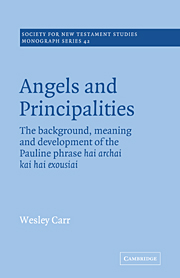 Angels and Principalities
Angels and Principalities Book contents
- Frontmatter
- Contents
- Preface
- Abbreviations
- General Introduction
- PART 1 The Background to Paul's Thought on the Powers
- PART 2 Exegesis of Pauline Texts
- 3 The powers and Christ triumphant
- 4 The powers and the spiritual world
- 5 The powers and the political world
- Conclusion to Part 2
- PART 3 The post-Pauline development
- PART 4 Final Remarks
- Notes
- Select Bibliography
- Index
5 - The powers and the political world
Published online by Cambridge University Press: 06 January 2010
- Frontmatter
- Contents
- Preface
- Abbreviations
- General Introduction
- PART 1 The Background to Paul's Thought on the Powers
- PART 2 Exegesis of Pauline Texts
- 3 The powers and Christ triumphant
- 4 The powers and the spiritual world
- 5 The powers and the political world
- Conclusion to Part 2
- PART 3 The post-Pauline development
- PART 4 Final Remarks
- Notes
- Select Bibliography
- Index
Summary
Romans 13: 1–7
The teaching of Paul in Rom. 13: 1–7 has been a central problem for the Christian Church throughout its existence. In the twentieth century, however, there has been a major revival of interest in the passage, partly through the influence of Dibelius and his thoughts on the angels of the nations and partly owing to the political upheavals in Europe, especially the problem caused in Germany by the rise of Hitler. The debate on the word ἐξουϭίαι in Rom. 13:1 has largely focused on the exegesis of Oscar Cullmann, to which attention must first be given.
Dibelius proposed a double reference for the word, which, he claimed, referred both to the actual human authorities and to spiritual forces that stood behind them. Cullmann has developed this and thus become the central figure in the debate. He expressed his views in Christus und die Zeit (1946) and The State in the New Testament (1956), with an important interim article, ‘Die neuesten Diskussion über die ἐξοϭίαι in Röm. 13: 1–7’. At the conclusion of this article he summarised his position:
‘The twofold interpretation of the ἐξουϭἰαι in Rom. 13, 1 as referring to the state and to the angel powers which stand behind it, is thoroughly justified as an hypothesis, from the standpoints of philosophy, Judaistic concepts, and the early Christian and Pauline theology. It is an hypothesis, and naturally we can never say with final certainty that Paul has in mind not only the secular sense of the word ἐξονσἰαι but also the meaning which he attributes to it in all other passages. I can only wish, however, that all other hypotheses which we necessarily must use in the field of NT science were as well grounded as this one.’
- Type
- Chapter
- Information
- Angels and PrincipalitiesThe Background, Meaning and Development of the Pauline Phrase hai archai kai hai exousiai, pp. 115 - 121Publisher: Cambridge University PressPrint publication year: 1981
